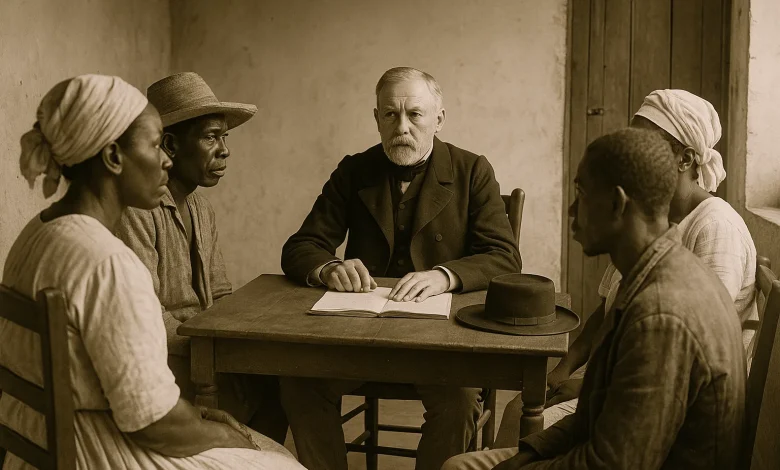Special Magistrates in Dominica (1834–1838)

Special Magistrates in Dominica (1834–1838) were stipendiary officers appointed by Britain to supervise and adjudicate the island’s post-slavery apprenticeship regime. Their remit began when the apprenticeship took effect on August 1, 1834, and ended when the system was terminated on August 1, 1838. Appointed largely from Britain, they staffed weekly courts, toured estates on a fixed schedule, and decided disputes between apprentices and employers under rules that capped required unpaid labour time.
Legal basis and appointment
Parliament embedded the post-slavery apprenticeship in the implementation of the Slavery Abolition Act 1833, creating a cadre of “stipendiary” or special magistrates to administer it at colony level. Contemporary guidance and later scholarship note that London recruited many from half-pay army and naval ranks to ensure independence from planter-dominated local benches. Their small salaries and limited numbers created heavy caseloads across the British West Indies.
Jurisdiction and powers
Special magistrates were tasked to sit at least once per week and to visit plantations with more than ten apprentices roughly every two weeks, inspecting estate books, time sheets, and complaint registers. They heard cases over work hours, passes, pay for task work beyond the required quota, interference with market attendance, and access to provision grounds. Crucially, the authority to impose corporal punishment shifted from estate managers to these officers, tightening oversight and placing penalties under quasi-judicial control rather than planter discretion.
A central standard they enforced was the ceiling on compulsory labour: in the Caribbean apprenticeship, former slaves, now apprentices, could be required to work up to about forty-five hours per week without pay, after which additional time could attract wages by local arrangement. The magistrates policed this boundary and sanctioned employers who breached it.
Procedures, records, and interaction with local courts
In Dominica the stipendiary courts sat alongside the Magistrates Court. Apprentices could bring complaints directly to the visiting officer or at weekly sittings in towns such as Roseau and Portsmouth. Proceedings typically involved sworn statements, checks of estate logs, and orders that might include fines, short confinement where ordinances allowed, or directives to restore market time or garden access. Where local justices were themselves planters, the presence of an outside officer was intended to reduce conflicts of interest in apprenticeship cases. Exhibitions and teaching materials on emancipation across the region underline this separation of roles.
Workload, constraints, and criticisms
The system drew criticism for being under-resourced. Studies focused on the magistrates point to too few officers, low pay, and wide circuits, which made fortnightly plantation inspections difficult in practice and exposed officers to pressure from both planters and apprentices. Nonetheless, the office mattered: it centralized punishment powers, set uniform expectations for hours and passes, and created paper trails that fed into colonial reports and later compensation and register data.
End of office and aftermath (1838)
Under public and political pressure in Britain, and amid colonial experience that showed the scheme’s coercive character, apprenticeship was terminated in 1838 across the British West Indies, including Dominica. With the legal regime gone, stipendiary functions wound down and ordinary disputes shifted to local courts in a setting of full civil freedom. In Dominica this change coincided with a distinctive political outcome: by late 1838 the island’s elected chamber was controlled by Black representatives, marking a sharp turn in representation while post-apprenticeship labour moved toward day work, task pay, and stronger market participation.




